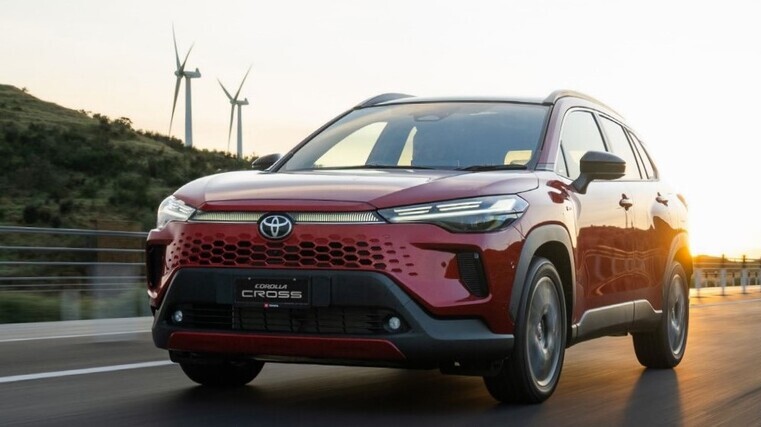Marque tackling emissions

Toyota New Zealand remains committed to reaching carbon neutrality by 2050 but admits there will be challenges along the way amid an “ever-changing automotive industry”.
The company has released its 2025 sustainability report and provided an update on its efforts to reduce carbon dioxide (CO2) emissions across the business.
Toyota NZ also set itself a target three years ago to reduce emissions from a 2019 baseline by 46 per cent by 2030, which it says forces changes on the business.
Tatsuya Ishikawa, chief executive officer, says while its operational emissions are on track, reducing the tailpipe emissions from the vehicles it sells is more challenging.
“This year, we have seen the gap to our 2030 target increase to 14 per cent – up from nine per cent last year – as a result of a more accurate emission factor for embodied emissions from manufacturing,” he explains.
“By including the emissions from the manufacturing process abroad with those of our tailpipe emissions we are closing the loop further. This is important for us as we aim to account for the full life cycle of the vehicles we sell.
“Electrification remains a critical pathway in our journey to 2030, and beyond.”
Ishikawa says Toyota NZ is focused on offering customers the right vehicle and the right powertrain for their lifestyle, while trying to transition as many consumers as possible into low-emissions models.
The report adds that as the leading car brand in the country with one in four vehicles on New Zealand roads being Toyota, “we recognise the impact we have on the environment ... [and] remain committed to reducing the carbon emissions from these vehicles”.
Its total scope one and two emissions, which relate to direct use of energy, reduced eight per cent in the year to the end of March 2025. This was primarily due to the vehicles in the fleet becoming more electrified and using less fuel.
Toyota NZ says such emissions are 38 per cent below the company’s target for the 2025 financial year.
As for its scope three emissions, which include those from the manufacturing process and from driving vehicles, the company notes about 96 per cent of these come from the units it sells.
“As Toyota NZ, we work with Toyota Motor Corporation to reduce emissions globally. Toyota is focused on reducing the emissions from its manufacturing plants using renewable energy and energy-saving technologies,” the report adds.
“We remain committed to our 2030 target. We have direct control over the vehicles we import and by electrifying our product mix further, we can reduce the tailpipe emissions from the vehicles we sell.
“We have increased electrification by 27 per cent from FY24 to FY25 and that has resulted in a 10 per cent reduction in tailpipe emissions.
“Despite the difficult economic conditions for automotive retailing in New Zealand in 2025, the sales of our new and used hybrid vehicles continued to increase throughout the year having a positive impact on the electrification of our product mix and tailpipe emissions.”
Toyota NZ sold 31,900 new vehicles in the 12 months to the end of March 2025, down from 33,906 in the previous financial year.
While sales fell, the electrification mix of 82 per cent was up from 55 per cent in the previous year.
Total CO2 emissions for new vehicle sales were 155g/km at the end of March 2025, down from 161g/km in the 2024 financial year. Toyota NZ aims to achieve 128g/km across its planned portfolio by 2027.
Lexus, as a standalone brand, for the same 12 months had 90 per cent electrification of sales and an average 110g/km, down from 125g/km.
The report also notes Toyota NZ’s used vehicle sales “have seen a large shift to hybrid vehicles”, with 53.6 per cent sold in the year up to March 31, 2025.
Milestones and achievements
Toyota NZ says it considers sustainability to be as much about long-term business viability and reducing carbon emissions as it is about supporting communities to thrive and prosper.
Ishikawa adds that when looking through the lens of sustainability, the past financial year was one of milestones and achievements for the company.
“For the 37th consecutive year, we retained our title as the country’s number one car brand, a reflection of the loyalty Kiwi drivers have towards the Toyota name and its vehicles.
“We were also named as number one in the Kantar Corporate Reputation Index for the second year running, making Toyota New Zealand the most reputable brand in the country,” he says.
“Retaining this position comes down to the trust we have built with New Zealanders, through our people and our stores – their customer-first approach, the community work they do, and the ultimate dedication they have to Toyota.
“It reaffirms our commitment to excellence, community partnerships and sustainability.”
He explains its sustainability objectives encompass environmental, social and economic considerations.
“Over the past year, Toyota NZ has made progress towards electrifying personal mobility. More than 80 per cent of all new Toyotas sold are now electrified.
“That shift is helping cut tailpipe emissions of the vehicles we sell and contribute to the overall reduction of emissions for New Zealand’s transport sector.
“We’ve sold more than 100,000 new hybrid vehicles in New Zealand. That’s the equivalent of adding 33,000 EVs to New Zealand’s road fleet and a saving of 120,000 tonnes of CO2 per year.”
With hybrid sales increasing, the recycling of batteries is also becoming a key focus area for the business.
Toyota NZ sends hybrid car batteries to Japan for dismantling, with 454 shipped back last year, as part of an ecosystem that collects and processes end-of-life hybrid batteries.
The work of its stores in their communities was also celebrated this year through Toyota NZ’s Citizenship Award, with examples of local community support initiatives highlighted in the sustainability report.
The company also draws attention to its sporting partnerships with New Zealand Rugby, Emirates Team New Zealand, the New Zealand Olympic Committee and Paralympics New Zealand.
“Toyota has always believed in the power of sport to unite people and boost morale. We are incredibly proud to partner this year with New Zealand Rugby as we support the teams in black and all the things Kiwis love about their country,” Ishikawa says.
To read the full Toyota NZ 2025 Sustainability Report, click here.





